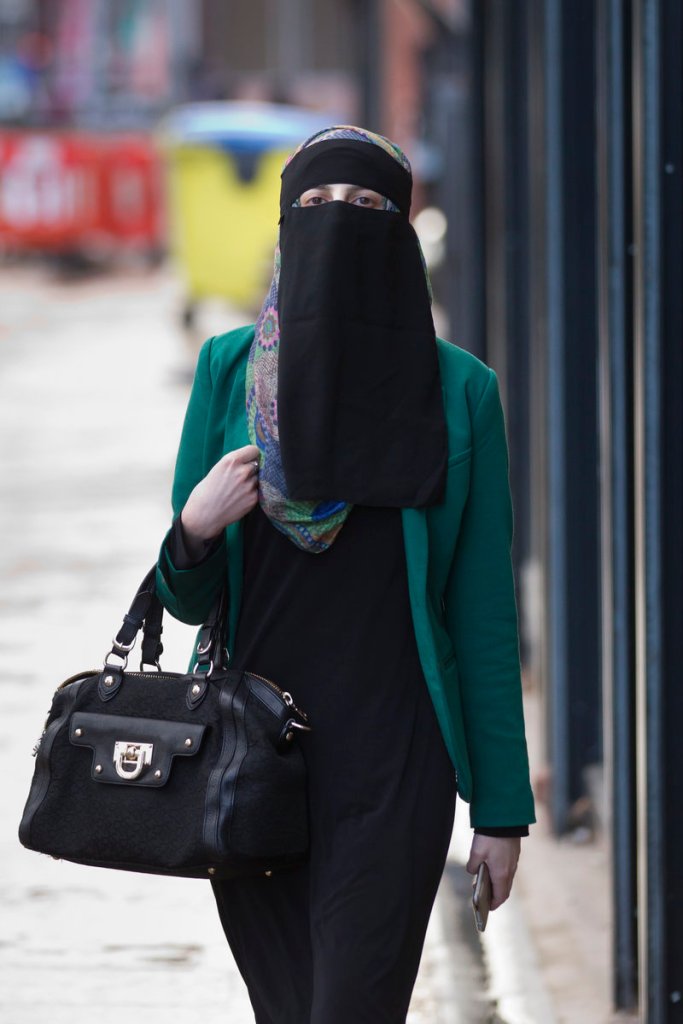LONDON
Woman must remove veil when testifying, judge rules
In Britain this week, a judge struck a blow for religious freedom. Or for secularism. It all depends on whom you ask.
Judge Peter Murphy ruled Monday that a Muslim woman may stand trial wearing a face-covering veil – but must remove it when giving evidence. The compromise ruling had some insisting it backs a woman’s religious right to wear the veil, and others saying it shows British justice remains independent and won’t bow to religious demands.
The case has reignited a debate about Muslim veils that has flared across Europe, sparking protests and exacerbating religious tensions in several countries. Those tensions exist in Britain, too, and attacks on Muslims and mosques rose after the May slaying of an off-duty British soldier by Islamist extremists.
But both the court ruling and the interpretations of it suggest that Britain is facing the issue with a streak of pragmatism, and there is little appetite from the center-right coalition government for a ban like that introduced in France.
This is a country where many politicians agree with the aide to former Prime Minister Tony Blair who famously said: “We don’t do religion.”
TEHRAN, Iran
New president insists Iran won’t develop nuclear arms
Iran will never develop nuclear weapons, President Hasan Rouhani vowed Wednesday in his first U.S. media interview since his inauguration last month.
Rouhani also said in the interview in Tehran with NBC News international correspondent Ann Curry that he has the authority to cut a deal with the United States and other Western countries to allay their fear that Tehran’s uranium enrichment activity is aimed at creating weapons-grade fuel for a nuclear bomb.
Rouhani said that President Obama had written to him to congratulate him on his June 14 election and to raise “some issues.”
“From my point of view, the tone of the letter was positive and constructive,” Rouhani said, according to an NBC News advance report on the broadcast. “It could be subtle and tiny steps for a very important future.”
Since taking office Aug. 3, Rouhani and his new Cabinet members have been sending tentative signals of willingness to improve relations with the West and ease social strictures and economic woes besetting Iranians who have been under U.S. sanctions for years because of the disputed nuclear program.
ELLENWOOD, Ga.
Teen taken in home invasion found alive
A 14-year-old Georgia girl abducted in a home invasion robbery was found alive on Wednesday after a wide search by several law enforcement agencies, and two suspects were in custody, police said.
Ayvani Hope Perez had been taken from her suburban Atlanta home early Tuesday after authorities said armed robbers broke in, demanded money and jewelry and were told there was none.
Clayton County Police Chief Gregory Porter said the girl was found in a nearby community, Conyers, and has since been reunited with her family.
Wildrego Jackson, 29, faces a federal charge of conspiracy to kidnap. The police chief also said Juan Alberto Contreras-Rodriguez, a 40-year-old Mexican national, has been arrested on immigration-related charges.
WASHINGTON
Researchers develop test to cut overuse of antibiotics
It happens too often: A doctor isn’t sure what’s causing someone’s feverish illness but prescribes antibiotics just in case, drugs that don’t work if a virus is the real culprit.
Now Duke University researchers are developing a blood test to more easily tell when a respiratory illness is due to a virus and not a bacterial infection, hoping to cut the dangerous overuse of antibiotics and speed the right diagnosis.
It works by taking a fingerprint of your immune system — how its genes are revving up to fight the bug. That’s very different from how infections are diagnosed today. And if the experimental test pans out, it also promises to help doctors track brand-new threats, like the next flu pandemic or that mysterious MERS virus in the Middle East.
That viral “signature could be quite powerful, and may be a game-changer,” said Dr. Geoffrey Ginsburg, Duke’s genomic medicine chief. He leads the team that on Wednesday reported that a study involving 102 people provided early evidence that the test can work.
— From news service reports
Copy the Story Link
Send questions/comments to the editors.



Success. Please wait for the page to reload. If the page does not reload within 5 seconds, please refresh the page.
Enter your email and password to access comments.
Hi, to comment on stories you must . This profile is in addition to your subscription and website login.
Already have a commenting profile? .
Invalid username/password.
Please check your email to confirm and complete your registration.
Only subscribers are eligible to post comments. Please subscribe or login first for digital access. Here’s why.
Use the form below to reset your password. When you've submitted your account email, we will send an email with a reset code.